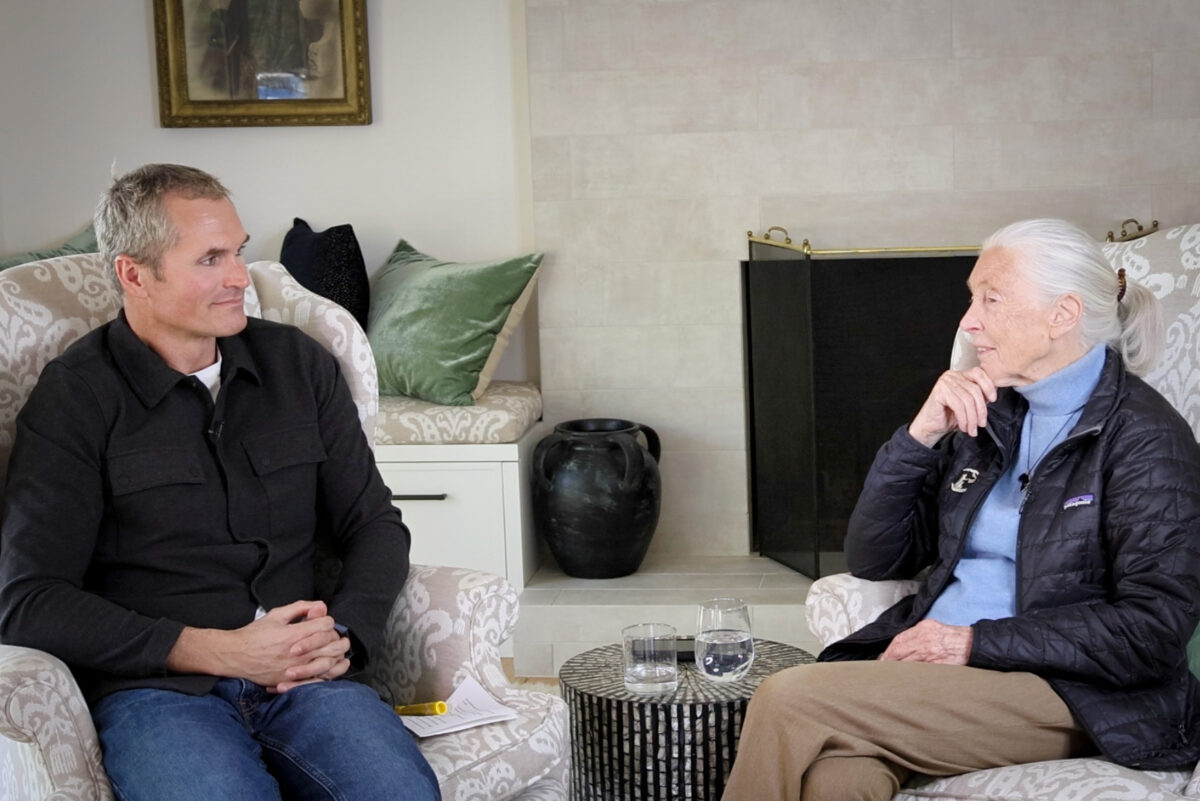Jane Goodall turns 90 on April 3rd. For the past few weeks, the world has been marking her birthday in a variety of ways, from a unique 90-dog salute on a beach in Carmel, California, symbolizing her life-long commitment to animal welfare, to galas in fancy ballrooms in the world’s biggest cities with global business and political leaders.
Last week, Goodall graciously sat for an extended conversation at my home in the San Francisco Bay Area. We covered a range of subjects, from empathy for plants and animals to the need for hope.
Before we jump into the interview, it’s useful to start by providing some context on Goodall, whose journey has redefined our understanding of the animal kingdom. This background will help us appreciate the insights from our conversation and understand why Goodall has become a towering figure in conservation and primatology.
Also a brief disclosure: Goodall has served on Mongabay’s Advisory Council since 2014.
Jane Goodall’s Path
With little more than a notebook, binoculars, and an indomitable spirit, Goodall set foot in the Gombe Stream National Park, Tanzania, in 1960. Under the mentorship of anthropologist Louis Leakey, her initial mission was to observe and record the behavior of chimpanzees. What followed was a lifetime of pioneering research, transforming her into one of the most influential primatologists and environmental advocates of the twentieth century. Her early observations laid the groundwork for future conservation efforts, significantly impacting the field.
Goodall’s contributions to science and our perception of animals have been substantial. Prior to her work, the line separating humans from animals was distinctly drawn and heavily guarded by the scientific community. Goodall’s meticulous observations blurred these lines, revealing the profound complexities of chimpanzee societies. She was the first to document chimpanzees making and using tools, a behavior that was thought to be exclusively human. This discovery challenged the anthropocentric view of intelligence and sent ripples through the scientific world, prompting a reevaluation of what it means to be human.
Beyond her scientific achievements, Goodall’s advocacy for animals and the environment has been relentless. She has consistently argued for the recognition of animals as sentient beings, capable of emotions such as joy, grief, and frustration. Her foundation, the Jane Goodall Institute, is at the forefront of efforts to protect chimpanzees and their habitats, combining conservation with community-centered development programs. Through her Roots & Shoots program, Goodall has mobilized a younger generation toward environmental stewardship, underscoring the interconnectedness of all living things. Her work has influenced public perception and policy changes regarding wildlife conservation, highlighting the broader impact of her efforts.
Goodall’s work extends beyond the confines of academic research to encompass global environmental advocacy. Her stance on sustainable living and ethical consumerism challenges both individuals and corporations to reconsider their impact on the planet. In a world teetering on the brink of ecological collapse, Goodall’s voice remains a clarion call for action. She advocates for a holistic approach to conservation, one that addresses the root causes of biodiversity loss and climate change.
Goodall’s legacy is a testament to the power of perseverance, empathy, and scientific curiosity. Through her pioneering research and fervent advocacy, she has not only altered our understanding of chimpanzees but also highlighted the urgent need for comprehensive strategies to protect our planet. Moreover, her role as a mentor and source of inspiration to the next generation of scientists and conservationists underscores her lasting influence on future leaders in the field. Goodall’s life work serves as a reminder that understanding our place in the natural world is the first step toward preserving it for future generations.

